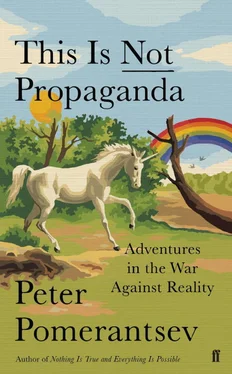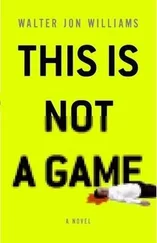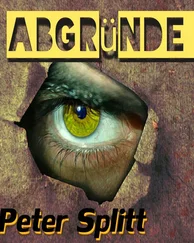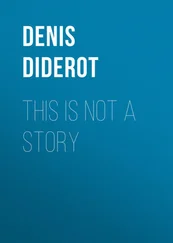NATO’s Supreme Allied Commander had called the Russian campaign to take Crimea ‘the most amazing information warfare blitzkrieg’ in history. But it was ordinary Ukrainians, often abandoned by a shoddy government, who had to find ways to make sure the information blitzkrieg wouldn’t spread to the rest of the country too. [14]
*
‘The worst thing about all of this’, Babar Aliev told me, as we sat, on a burning hot summer’s day in 2015, in a Severodonetsk cafe blaring out painfully loud techno overlaid with high-pitched Russian female vocals, ‘is that I have to carry a weapon again. Ten years ago, I promised never to carry a gun. But I regretted that promise when the separatists came. Next time I will be ready.’
Severodonetsk is in East Ukraine, just a few kilometres from the Russian border, where in 2014 Russian troops were massing in what seemed to many the preparation for an invasion. A rumour had just swept through Severodonetsk’s Internet portals about how Pravy Sektor were on their way to haul down the town’s Lenin statue, a symbol of pro-Russian leanings. Local groups – Russian Cossacks and Russian wrestling, laser-tag and literary clubs – gathered to defend it. The rumour was false – someone was trying to get the pro-Russians fired up. This wouldn’t be too hard. Severodonetsk is not a town that feels much historic loyalty to the Ukrainian state. It was built in the 1950s, a perfect grid of Soviet modernist white rectangles designed around sixteen science colleges and four chemical plants. Like much of the east, the inhabitants came from across the USSR. After the Second World War, it was one of the few places you could go with no papers – a bureaucratic trick to get criminals and vagabonds to come and work the heavy industry. After the end of the Soviet Union, the town went to pot: the plants are now stripped carcasses, the neat modernist rectangles cracked and peeling, the potholes in the roads so bad you drive in weird swerves. The writer Owen Matthews once compared parts of the former Soviet Union to an experiment abandoned by its scientists, the people lab rats left to rot and eat each other. In Severodonetsk, with its mix of symmetry and dilapidation, this seemed particularly apt. For many, Russia represents a better place.
Babar, a thirty-something web designer of mixed ethnicity from across the former USSR, had noticed that the pro-Russian clubs had started to proliferate here in greater numbers after 2012, just as Vladimir Putin was facing off mass protests against his rule in Moscow. Since the start of the Maidan uprising more had appeared. At the time Babar had thought nothing of it – Ukraine was a democracy after all. Now he suspected someone had been planning something for a while. During the day the pro-Russians would gather in the main square, where Orthodox priests (from the Moscow patriarchate) and Communist Party leaders were holding daily rallies calling for unification with Russia, claiming the Maidan had been led by fascists and fed by drugs.
‘If we let them pass, then the country rolls backwards,’ Babar thought to himself. He had been in Kiev during the Maidan and had felt that the revolution was some sort of historical leap into something new. He had been disgusted when he saw the riot police beating up students in Kiev. Over the last few years he had seen how Yanukovich’s party was raiding businesses and pillaging the country: government run as a protection racket, propped up by Putin. Now, in a Severodonetsk abandoned by the government, he felt it was up to him to fight an information war against the enemy all by himself, hoping that he could galvanise others to join him.
Maybe he was motivated by the sense that there was also a part of his own past he didn’t want to ‘roll back’ to. As a teen in the mid-1990s Babar had been a gang leader. His speciality was planning and executing complex burglaries (he always looked down on mere protection rackets: where was the art in that?). Then he moved on to stripping the local chemical plants of precious metals – gold and platinum (he had read up on the periodic table). He dropped the thug life after he was finally caught (he had studied law and knew how to bribe his way out). But even now, when he has long been a web designer and minor Internet PR guy, he has the swagger, shell suits and fast eyes of the smart hoodlum (as well as the sudden ecstatic grin of a toddler). In Severodonetsk many still find it hard to believe that Babar has, as he likes to put it, ‘developed an aversion to slicing people up’.
During his time in the Maidan Babar had developed a Facebook following among pro-Ukrainians in Severodonetsk, and now he used it to fight back against the separatists online – to ‘nightmare them’, as the Russian phrase goes. Babar put out a story that separatists had beaten up some gay activists, and now a battalion of gay fascists was coming from Holland to take revenge. The story was ridiculous, but some of the separatists fell for it and started to get alarmed, which made them look like idiots. Babar also put out a story that two hundred undercover Pravy Sektor agents had holed up in flats in Severodonetsk; that they rode the trams listening to people’s conversations; that when they heard pro-separatist talk the agents would take people off the tram and they were never seen again; that they recorded the names of taxi drivers who wanted Severodonetsk annexed. The separatists’ portals were in a panic, and Babar felt he was winning the disinformation war. He wanted them to doubt everything and lose their bearings – to do to them what the Kremlin was doing to Ukraine.
Now he needed to build a coalition to take onto the streets. But how would he motivate them when there was no overall idea of Ukraine they related to, and when each tribe in the city lived in its own little information bubble?
Babar went to the organised crime bosses, known as Vori v Zakone (thieves-in-law), who lived according to a strict prison code. Some of them had been in Babar’s first gang before he straightened out. ‘How can you be on the same side as the cops?’ Babar asked them, slipping into Fenya, the prison jargon which Vori v Zakone communicate in. ‘You used to be an honest prisoner [i.e. someone who lives by the prison code]. Now you’re a goat and you’ve got horns on your head [in prison jargon a “goat” is a turncoat, the lowest of the low].’ The Vori v Zakone and Babar counted the cost to their business interests if the Kremlin invaded, so decided to back Ukraine. They offered Babar men and guns.
Babar also went to see the hoodlums who ran the protection rackets. Did they really want to have Russian gangsters come here? They would take away their territory. And while the local gangs had the Ukrainian police sown up, Russian police might have other ideas. The gangs told Babar they would back him.
Then Babar went to the businessmen. ‘You guys have been to Europe,’ he said. ‘You know how much easier it is to do business there: no hassle from bureaucrats wanting bribes or gangs wanting protection money. Well, the Maidan is all about us having European rules. Don’t you want that?’ The businessmen came on side too.
Now he had his coalition, for backup Babar reached out to Kiev-based Maidan activists with connections to the new government. Just a few special forces would be enough. Throughout the spring of 2014 town after town in the east was being taken by separatists backed by Russian special forces, the flags of the independent Donetsk and Luhansk ‘People’s Republics’ hoisted over local administration buildings. Babar kept on waiting for a sign from Kiev, but none came. He began to suspect the Donbas had been traded in for some deal with Moscow. He kept on calling his contacts, explaining to them that he’d done all the preparatory work – the disinformation campaign, building up the alliance of different groups…
Читать дальше












